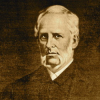Tryon Edwards

Tryon Edwards
Tryon Edwards was an American theologian, best known for compiling A Dictionary of Thoughts, a book of quotations. He published the works of Jonathan Edwardsin 1842. He also compiled and published the sixteen sermons of his great grandfather, Jonathan Edwards, on 1 Corinthians 13, the "Love Chapter", titling the book "Charity And Its Fruits; Christian love as manifested in the heart and life", which was thought by some to be the most thorough analysis of the text of 1 Corinthians...
NationalityAmerican
ProfessionTheologian
CountryUnited States of America
A holy life is not an ascetic, or gloomy or solitary life, but a life regulated by divine truth and faithful in Christian duty. It is living above the world while we are still in it.
We should be as careful of the books we read, as of the company we keep. The dead very often have more power than the living.
Anxiety is the rust of life, destroying its brightness and weakening its power. A childlike and abiding trust in Providence is its best preventive and remedy.
This world is the land of the dying; the next is the land of the living.
Seek for duty, and happiness will follow as the shadow comes with the sunshine.
Common sense is, of all kinds, the most uncommon. It implies good judgment, sound discretion, and true and practical wisdom applied to common life.
The most we can get out of life is its discipline for ourselves, and its usefulness for others.
Some so speak in exaggerations and superlatives that we need to make a large discount from their statements before we can come at their real meaning
Accuracy of statement is one of the first elements of truth; inaccuracy is a near kin to falsehood.
People never improve unless they look to some standard or example higher or better than themselves.
He that never changes his opinion never corrects mistakes and will never be wiser on the morrow than he is today.
Facts are God's arguments; we should be careful never to misunderstand or pervert them.
To rule one's anger is well; to prevent it is better.
Seek happiness for its own sake, and you will not find it; seek for duty, and happiness will follow as the shadow comes with the sunshine.